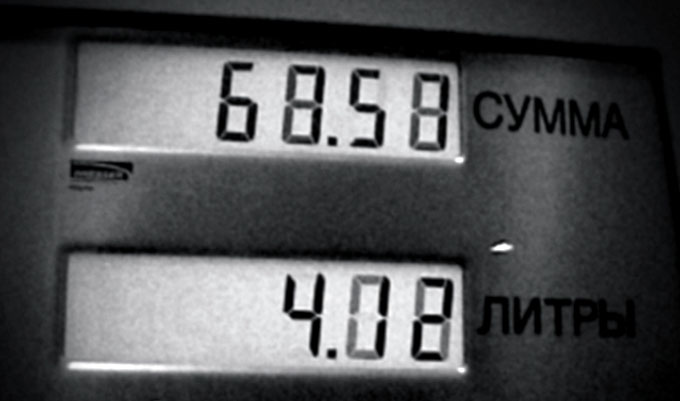
We live in a world of technology – exponentially increasing breakthroughs in all things scientific. So fast that we can’t even keep up with it. So why is it that the audio quality of music is degenerating? Music ‘sounds’ worse. We have stopped listening, we don’t have time. We only have time to be smacked in the face by the loudest, most attention-grabbing blast of souped-up noise imaginable until ear fatigue sets in and the desire to ‘change the record’ takes over. Why are the adverts on TV twice the volume of the regular broadcasts? It’s the only way to get our attention in the VOLUME WAR.
In recent years, a revolution in processing technology has instigated a change in the way albums are mastered. In order to compete, A&R men, producers, even the artists are demanding that mastering engineers, via digital compression, crank up the level so high that all dynamic range is callously sacrificed.
(Compression essentially increases the volume of the quieter elements within a mix while holding steady the peaks of the louder parts)
The effect of excessive compression is to obscure sonic detail and rob music of its emotional power leaving listeners strangely unmoved. In fact, the ear naturally compresses high volume blasts to protect itself – this is why we associate compression with level. Our sophisticated human brains have evolved to pay particular attention to any loud noise, so initially, compressed sounds seem more exciting. It is short lived. After a few minutes, research shows, constant volume grows tiresome and fatiguing.
True excitement comes from variation in rhythm, tone, pitch and a wide range of dynamics which in turn provides space and warmth – something you’re unlikely to find in much of today’s rock/pop music. If you want a good example, listen to The Arctic Monkeys ‘I Bet You Look Good on the Dance Floor’ for a bombardment of the most unsubtle, one-dimensional noise.

The download spiral…
At the moment, MP3 compression allows a smaller file to be created by excluding the musical information that the human ear is less likely to notice. Much of the information left out is at the very high and low end (MP3s don’t reproduce reverb well for similar transience reasons). So when the already squashed CD master is then consumed via MP3, the flattening effect is enhanced further. The result – an unsatisfying, brittle, indistinct, hollow experience with no punch.
Just as the CD replaced vinyl, we all know that MP3 and other digital formats are quickly replacing CDs as the most popular way to listen to music. This means more convenience but inferior sound (although that may improve over time). Even the audiophiles have moved on to multi-media – the iPod or iPhone being the ‘must have’ item of choice. Many have lost interest in high-end stereo systems while younger listeners have grown so used to dynamically compressed music that the battle has already been lost.
But this is not the whole story. We are seeing the ramifications of this subtle but significant listening shift for the record industry. You see, it’s not just about audio quality. It is about craft, toil. It’s about art…
Art for art’s sake
I am slightly out of the ordinary in that I am not a hugely ‘successful’ artist in terms of commercial sales and in that sense, I struggle to be heard just like millions of other musicians. However, because of my background in Depeche Mode, I am secure, which has meant (and continues to mean) that I don’t have to tailor what I do to conform in any way. The market shift hasn’t really affected me that much. It certainly doesn’t change how I approach making music. It does reinforce my cynicism towards the injustice of so much good music lost in the mêlée of dross. But that is nothing new. The nature of mainstream radio hasn’t improved in any way; magazines have minimal impact, television exposure is more limited than ever – notwithstanding MTV channels which have become more and more marginalised. In fact the best way to get your music heard is through a TV advertisement.
Leaving viability aside for a moment, I would like to see a return to high quality art, embracing all the wonders of technology and science, delivered at a price that reflects the time and effort the artist has put in. Call me old fashioned. Just as one would expect to pay for a hand-crafted piece of furniture or a designer dress or a beautifully printed photograph. Rather than pandering to mass media, why not also produce higher resolution audio – maybe on DVD since that’s a format most people can engage with without having to buy new equipment? Combine this with lovingly produced artwork which, if a printed option is too expensive, can at least be downloaded.
Collectors items are becoming a way to escape the turmoil. It makes a lot of sense to subsidise the production of an expensive format for those who really appreciate quality and collectibility by allowing a wider audience to cough up a minimal amount for the fundamental elements.
Some have tried. For instance, Magne Furuholmen (A-ha) released and sold 300 copies of a special 10″ vinyl picture disc with hand-painted original sleeves, accompanied by a CD containing all the songs, a poster and a documentary charting the creation of the artwork. The package sold at 100 Euros a piece. Afterwards, all songs were made available on-line for free via MySpace. Hats off to a bold approach which effectively encouraged each serious fan to also become a kind of personal investor.
The successful implementation of a DVD/art/film package such as this by a major company largely remains to be seen. No reason for it not to work as long as the label takes a pragmatic view about downloads – that they can only really act as a promotional tool rather than generating a sustainable source of income.
But really, coming up with a format is the least of the challenges – the difficulty as always is how to sell it.
Certainly trying to get any sort of coverage in the record stores ceased to be a viable option some time ago. The chains themselves are on their last legs (note the recent demise of the excellent ‘Fopp’ stores) or they are mutating into something different – focusing on games, merchandise, iPod accessories and so on. To ensure their own survival, with their ‘no returns’ policy, the record stores exert heavy pressure on the record companies by only agreeing to stock ‘dead certs’ – just the best selling artists, in order to avoid being left with excess stock.
As for marketing and promotion, I want the first listening experience of one of my records to be exactly as I intend it to be heard. For that reason, no longer will I be offering up advance copies for charlatans posing as journalists to sell on E-bay or upload to The Pirate Bay 3 months ahead of release. Considering the amount of advance promotion I get these days, it won’t make a blind bit of difference to the sales performance.
Not that there aren’t any positive sides to fan-shared files. Clearly, people in remote parts of the world – Siberia for example – can potentially be exposed to my music this way, albeit not, as yet, at optimum quality. It’s not ideal but better than no opportunity to hear it at all. Even with CDs, in Russia, they are impossible to buy outside of the major cities which is why we get sharp, entrepreneurial fan sites buying up all the city’s stock and selling it on to others outside for a small profit margin.

From Russia with love
Recoil recently released an enhanced CD including a film and a special booklet. Let’s take a look at the process. The ‘Prey’/’Allelujah’ package was brought about through fan pressure; by those that want a physical product – completists maybe, but also music lovers who prefer the audio and tactile quality of a CD over downloadable ‘faceless’ products. The tracks had already been available as downloads but it wasn’t satisfying for many. The generation gap is showing.
Following a successful promo appearance in Moscow, a local DM/Recoil webmaster managed to persuade Gala Records (EMI’s local label – Mute’s partner) that it would be worthwhile to release this disc. They agreed – not without conditions mind you. So what was agreed?
Firstly, the promo trip was instigated by an Electro club manager. The club paid for and largely organised the visit. On the back of that, Gala arranged some radio, press and TV. The results were more than encouraging but despite this, the conditions of a release meant that: the fans had to pay for the manufacture of the disc, the fans had to implement pay structures and distribute the disc via their own website, other Recoil fans produced the artwork for a 28 page booklet that accompanied the disc, another fan produced and directed the 9 minute film that was included for ‘Allelujah’, the artist (me) produced the music in his own studio, the artist funds its own website along with a dedicated webmaster that works for free, the artist and the fans took care of the on-line marketing, promotion and sales support. All these services were provided as labours of love – no cost except for time and effort through sheer will to make it happen. Astounding. And it warms the cockles of my heart.
So what did the record company do, you ask? A good question. The record company organised the parts into a manufacturable product – this means making a production master from existing music mixes and cobbling together a two-page inlay with label copy from existing artwork. The local licensee added cyrillic legal jargon to the inlay and alerted some press and TV. Not much really is it?
Ok, this is not the norm and as such, slightly unfair. It was a kind of one-off experiment. Gala/Mute might argue – a favour. But it is most definitely the way things are going. Why won’t they release the CD in the usual way? Because they don’t believe the demand justifies the effort and manufacturing costs when the trend is for cheap or free downloadable music.
The Russian project was an interesting experiment but it could only expect limited success given the current view of that country and the customer mistrust that seemed to permeate the whole enterprise. It wasn’t an ideal way to try to sell a product but that doesn’t preclude the process itself becoming perfectly workable – as long as solid logistics are in place, making it simple and reliable for the customer.
(Note: despite the obvious hurdles, in fact we still managed to sell all the planned stock prior to release, such was the demand)

Pop will eat itself?
So why bother with a record deal at all? And that is what many artists are now asking themselves. Why wouldn’t they when they are being told that their company just can’t afford to spend any money? Or that the company wants a cut of the artist’s live income to pay for marketing. This is why we see the mass exodus taking place, squeezing the already crippled record industry. The artists that find it easiest to walk away are those that are already highly successful, compounding the problem still further. Why? Because the likes of Radiohead and Prince can afford to give their music away as a cheap promotional gimmick in order to create publicity for their respective machines. They get noticed for doing so and benefit in other areas. So with everyone now expecting free music, all the other artists lose what little income they could expect from record sales, even though the love and money spent producing their product hasn’t changed.
I’ve long since given up expecting to make a profit from what I do. And you might expect that I would be full of resentment and bitterness toward my own record company but that’s not really it. Mute are victims in all this. The reality is that all the companies are suffering and are desperately clinging on by their fingernails trying to come up with solutions as the rug is pulled from beneath them.
In Mute’s case, EMI have inflicted so many spending restrictions and are ‘re-shaping’ and ‘streamlining’ with department ‘centralisation’ and the reduction of the artist roster. EMI big cheese Guy Hands describes his business as ‘an unsustainable model’ with a need to ‘reduce waste’…. Garbage collection. Thinly veiled rhetoric meaning CUTBACKS! He talks of ‘eliminating duplication and bureaucracy’. Bottom line: 2000 jobs have to go.
More worryingly, he also offers us the information that currently about 3% of the entire roster is profitable and that those that never will be profitable, no matter how the model is changed, can kiss their arses goodbye. That is about as far away as you could ever get from what I understood as the Mute philosophy, where the profit from major selling acts is used to nurture all the other artists on the label. Art. A record company does not sell baked beans, it exposes art to the masses. An unquantifiable thing. Baked Beans – a quantifiable thing.
But is that philosophy realistic in these times? Clearly not if you’re ruled by a private equity conglomerate. The Mute home (now part of the EMI building) is a shadow of its former self. A few lost souls wandering around in a post-apocalyptic daze, like a scene from ‘28 Days Later’. There are some good people at the label who have their hands tied. And their feet bound. And some gaffer taped firmly across their mouths, helplessly kidnapped having been lured into the corporate machine.
Of course Mute can’t just up and leave. It would be like trying to put your house up for sale when you’re only renting it. I imagine Daniel Miller is as concerned as the next tenant. He is contracted to EMI as Mute’s label boss and his own future I imagine is unclear. Maybe he is tired of the whole business, his original vision impaired beyond repair. I’m sure he is just as passionate about music as he ever was, but who would want to start a new record company in the current climate?
And can the musician act as entrepreneur? Is it fair to expect our scatterbrained creative songwriters and virtuosos to also hold a degree in business management? Formulating their own strategies and marketing models as they go? I mean wasn’t this the whole reason record companies and managers came into existence in the first place? From my own experience, simply trying to ‘stage manage’ what has been a very small-level experiment has taken up most of the first 3 months of the year – valuable time which I intended to spend composing new music.
Business acumen will vary but it is essential for artists and their representatives to try and stay ahead of the game, to think up new endeavors. One could see the return of small art-focused indie labels employing a new modus operandi (it’s already happening if you look around) with minimal overheads, operating more as logistical support to the artists, organising the manufacture and effective mail order distribution via the artists websites and other associated outlets. Taking the strain. (This doesn’t mean one has to abandon the idea of mass availability via iTunes or similar)
By the time I finish another album, who knows if I’ll have a record deal at all? It would be a shame to end my association with Mute after such so many good years but I’ve got a feeling the decision could be out of my hands. Much depends on the future of Mute/EMI and indeed all the companies. It could be that the major selling artists on Mute just get sucked into the EMI machine and all the others fall by the wayside, including the Mute label itself. It will be a sad day indeed.
So who shall we blame for the whole mess? Do we stick two fingers up at the record companies who have sat around twiddling their thumbs, peddling overpriced re-issues for years while their A&R men bombard us with shallow, faceless pop idol, X factor boy bands? Is it fair to say “… well, you had it coming”…? Or do we accuse the casual ‘non-listener’ with the attention span of a three year old living in a disposable, homogenized, Paris Hilton-obsessed society, over stimulated with too much life choice? A society that places value in triviality and accepts mediocrity without much question? Or perhaps the devaluation has evolved from the cult of the DJ, where anyone can regurgitate the very essence of rock ‘n’ roll by lifting an entire 70’s funk classic, adding some rap drivel over the top and calling it their own work? Is modern music regarded as an art form at all anymore? Or is it just another business now?
Alan Wilder
(Thanks to Bernard Van Isacker for his input)

